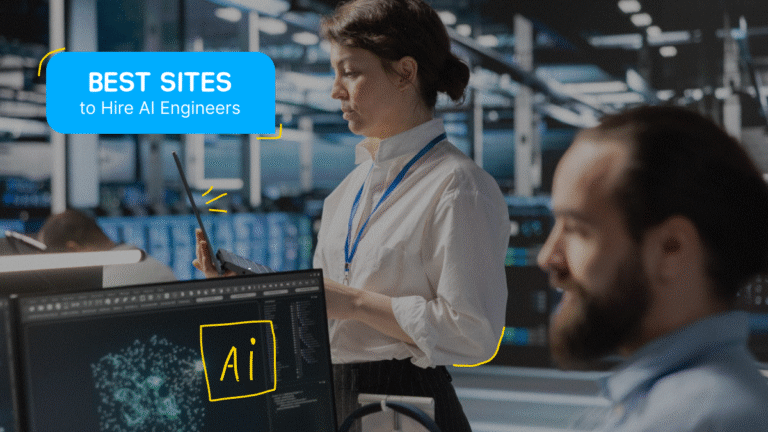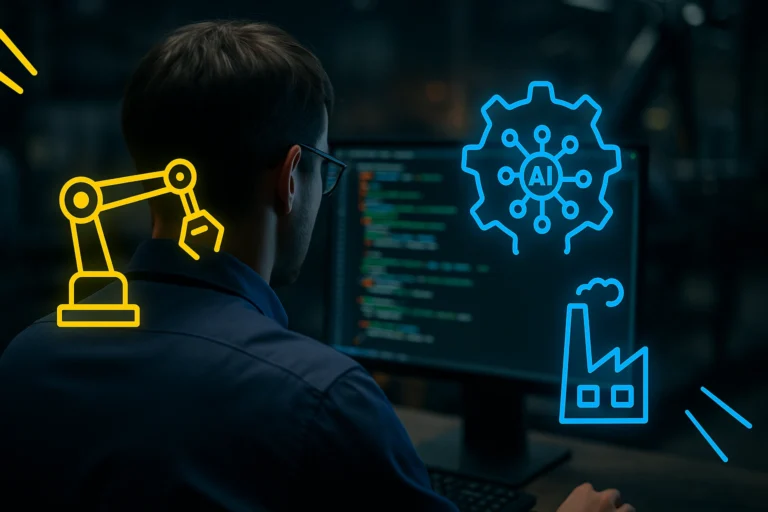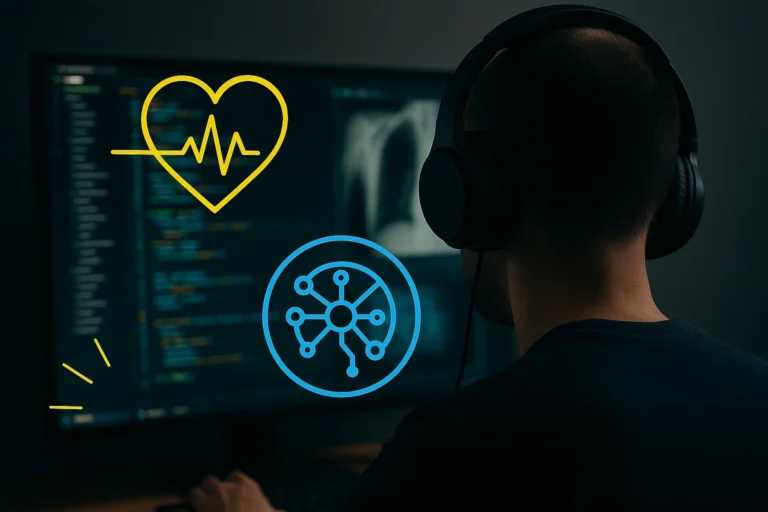AI Engineer Skills: Top Skills Required for AI Excellence
- Technical Expertise and Hard Skills for AI Engineers
- Additional Top Skills for Artificial Intelligence and Machine Learning Excellence
- Specialized Skills in AI Subfields Required to Develop AI Applications
- AI Ethical and Security Considerations Every Software Engineer Should Know
- Technical Skills Required for AI Engineering Based on Industry Demand for AI
- Do Soft Skills Matter? Must-Have Non-Technical Skills for AI Engineers
- Where to Learn AI Engineer Skills: Key Career Development Recommendations
- Final Words: A Glimpse into the Future of AI
- Frequently Asked Questions (FAQ)
With the rapid growth of artificial intelligence technologies in recent years, demand for AI engineers has soared, and for good reason. The high value placed on AI engineer skills and expertise reflects AI’s powerful impact on various sectors:
- In healthcare, AI frameworks assist in creating patient treatment plans 13 times faster than traditional methods and improve cancer diagnostic accuracy by 20%;
- AI-driven recommendation engines in retail contribute to around 35% of the brand revenue, equating to approximately $52 billion annually for giants like Amazon;
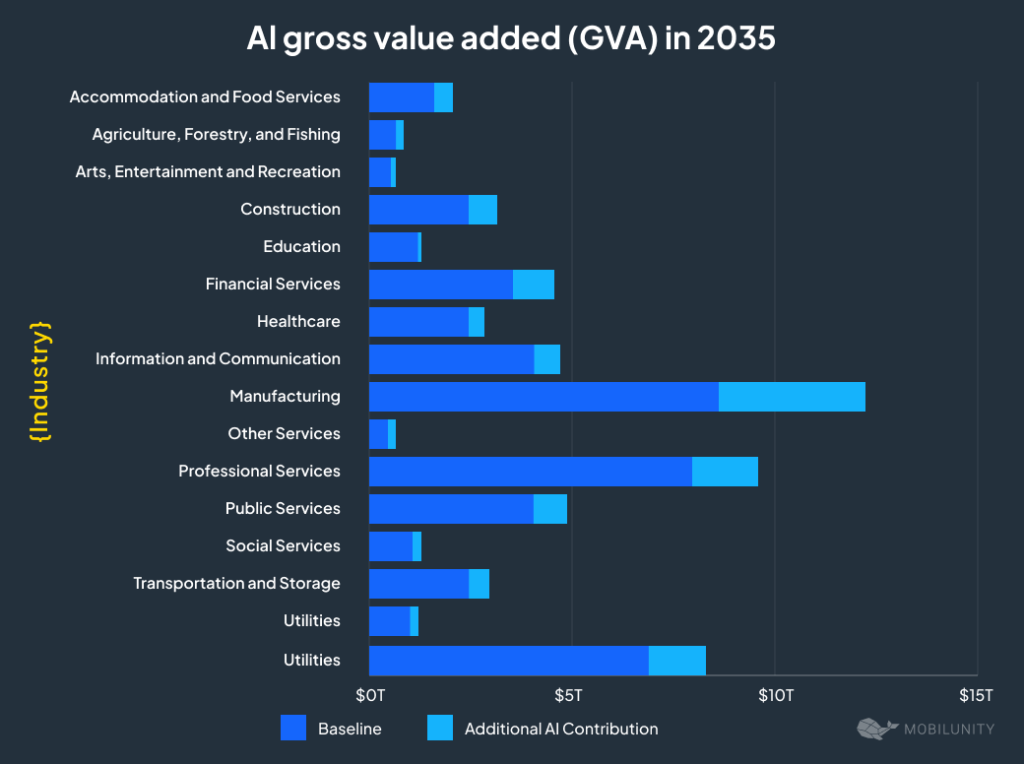
The list of real-life AI impacts goes on and on, but there’s a catch. To leverage highly efficient artificial intelligence, AI engineers should possess specialized tech knowledge and a comprehensive skill set. Let’s review them in detail.
Technical Expertise and Hard Skills for AI Engineers
Tech Stack Proficiency
AI-proficient engineers must write clean, efficient, and scalable code, ensuring their AI frameworks run effectively in various environments. It involves:
- Tech stack for developing and training AI models — Python, Jupyter Notebooks, CUDA, PyTorch, TensorFlow, Hugging Face, Pandas and Dask, Matplotlib, Seaborn, TensorBoard;
- AI deployment stack — Docker, Kubernetes, FastAPI or Flask, ONNX Runtime, MLflow;
- AI integration stack — Java/Scala, RESTful APIs, gRPC, PostgreSQL, MongoDB, Kafka, RabbitMQ;
- AI monitoring and maintenance stack — Prometheus and Grafana, Sentry, Airflow, Elastic Stack (ELK).

Understanding of Machine Learning Algorithms
ML expertise is the foundation of building effective, adaptable, and reliable systems. From image recognition and natural language processing to autonomous vehicles and personalized recommendations, AI algorithms must continuously learn and improve from data.
To achieve this, there is a range of specific skills you need to possess as an AI engineer:
- Supervised learning — tasks like classification and regression allow for the creation and training of accurate predictive models for real-world applications;
- Unsupervised learning — critical for analyzing unlabeled data and identifying hidden patterns using clustering and dimensionality reduction techniques;
- Reinforcement learning— needed for building adaptive systems where agents must adapt and learn through trial and error;
- Transfer learning — to leverage pre-trained models on large datasets, thus reducing training time and resource requirements for new tasks;
- Meta-learning — ensures the creation of systems based on the concept of “learning how to learn,” enabling quick adaptation to new problems;
- AutoML — essential for streamlining the development pipeline through automation hyperparameter tuning and model selection processes;
- Explainable AI (XAI) — techniques like LIME or SHAP are key for explaining model predictions and ensuring transparency.
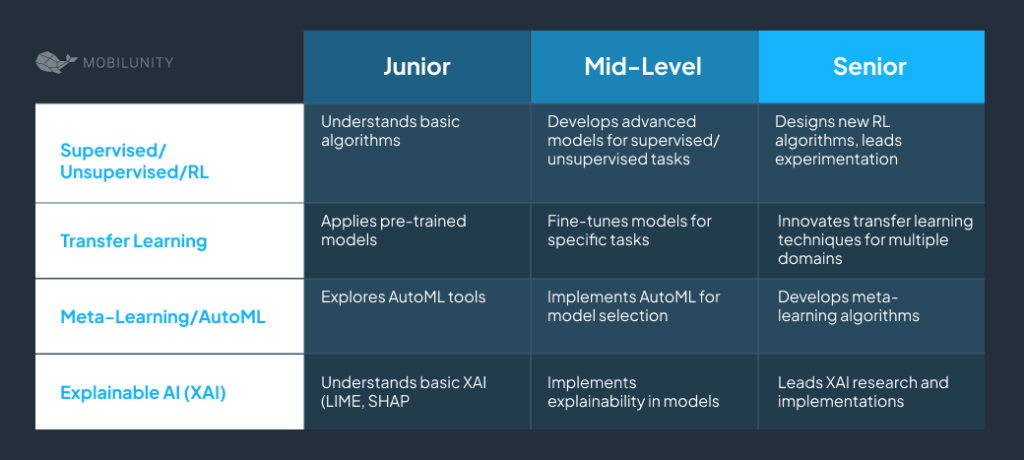
Neural Network Architectures
Understanding various neural network architectures — from convolutional neural networks (CNNs) for image tasks to transformers for NLP — allows AI engineers to select and optimize suitable models for specific tasks.
Without the below-mentioned knowledge, the development of efficient and scalable AI-driven solutions can be compromised:
- Convolutional and recurrent neural networks — crucial for image processing and handling sequence data in AI-powered visual recognition tasks;
- LLMs and prompt engineering — for ensuring efficient adaptation to specific tasks without the heavy computational costs of full retraining thanks to fine-tuning pre-trained models using methods like LoRA (Low-Rank Adaptation);
- Transformers and attention mechanisms — essential skills for performing advanced NLP tasks and processing sequences of data, particularly in applications like language translation, text summarization, and conversational agents;
- Generative Adversarial Networks (GANs) — crucial for leveraging robust AI-powered image generation tools and other creative applications;
- Graph Neural Networks (GNNs) — for developing AI architectures that understand the complex interdependencies in data, such as recommendation systems, social networks, and biological networks.
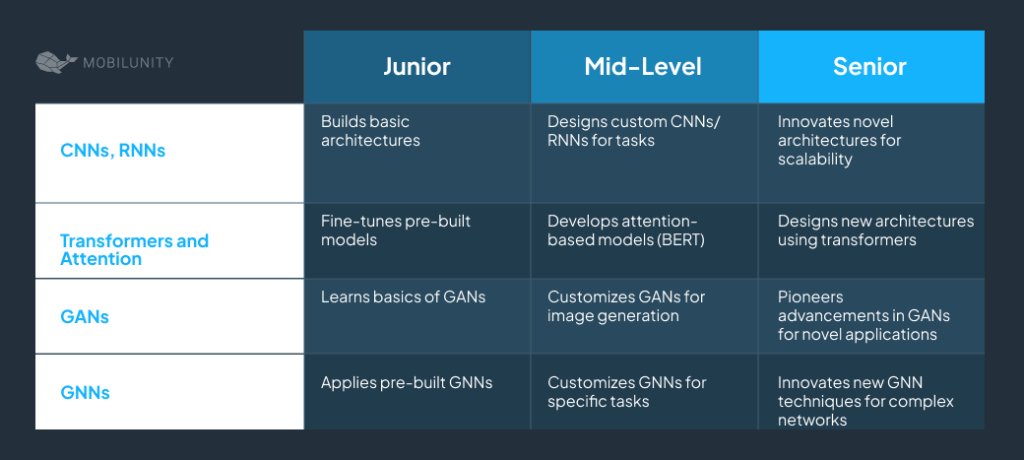
Data Handling and Big Data Technologies
Since AI systems rely heavily on data, engineers must ensure that data is clean, well-organized, and accessible.
Therefore, the following technologies expertise is indispensable:
- Data preprocessing and cleaning — a prerequisite for model accuracy, incorporating the knowledge of how to clean, normalize, and transform data into a usable format;
- Feature engineering — a vital skill for ongoing AI-powered system improvements;
- Big data technologies — crucial for effectively manipulating and analyzing vast amounts of information (by using solutions like Hadoop and Spark);
- Data pipelines — incorporate the ability to streamline data flow processes, scalability, and reproducibility (for example, with tools like Apache Airflow).

Additional Top Skills for Artificial Intelligence and Machine Learning Excellence
Cloud Computing and Distributed Systems
Proficiency in cloud computing and distributed systems empowers AI-skilled engineers to build scalable and collaborative AI tools, all thanks to this technical expertise:
- Knowledge of major cloud platforms — familiarity with AWS, Google Cloud, and Microsoft Azure unlocks access to numerous AI-related services and benefits, including computing resources, data storage, and machine learning tools;
- Distributed computing — frameworks like Apache Spark, Dask, Ray, and others are indispensable for optimizing resource utilization and improving the training and inference of models, particularly for large datasets and real-time applications.

AI and ML Frameworks
Knowledge of frameworks for building ML models offers several key differentiators: interoperability with various tools, community support for troubleshooting, and fostering experimentation, to name a few.
Without these frameworks, AI engineers risk missing out on the efficiency and robustness of their AI models:
- TensorFlow — for creating complex models that can be deployed across various platforms;
- PyTorch — a must-use tool for research, experimentation, and rapid prototyping
- Keras — recommended for streamlining and optimizing the process of building models.
- ONNX Runtime — an increasingly important tool because most applications demand real-time processing and reduced latency.
Above all, proficiency in deploying AI at the edge offers advantages like real-time processing, enhanced privacy, reduced cloud reliance, and optimized performance on resource-constrained devices.
Since Edge AI involves running AI models locally on devices like smartphones, IoT sensors, or autonomous vehicles, it helps minimize latency, reduce bandwidth usage, ensure data privacy, and efficiently support applications needing immediate responsiveness. Meanwhile, when working with Edge AI, engineers need to possess a range of expertise to address various challenges:
- The ability to reduce the size and complexity of AI models while maintaining accuracy for real-time use;
- Proficiency in adapting AI models to various hardware and software environments;
- Expertise in designing energy-efficient AI solutions minimizing power consumption to extend battery life on mobile and IoT devices;
- Knowledge of safeguarding sensitive data processed locally on edge devices;
- The ability to balance costs and performance using specialized hardware like GPUs and TPUs;
- Proficiency in designing systems that perform reliably in cases of low or intermittent connectivity conditions;
- Skills in optimizing AI pipelines for real-time responsiveness to achieve low-latency performance for time-critical applications.

Hardware Optimization
This skill is particularly critical in resource-constrained environments or applications requiring real-time processing.
By understanding the underlying hardware, such as GPUs and TPUs, AI engineers can tailor their algorithms to leverage parallel processing capabilities, reduce latency, and improve overall computational speed. For example:
- GPUs — a powerful approach to parallel processing, helping to cut down training times for complex neural models;
- TPUs — familiarity with TPUs allows developers to optimize high-throughput machine learning tasks, particularly with TensorFlow;
- FPGAs — allow for creating customizable hardware solutions that are both high-performing and resource-efficient, especially for edge devices.

Model Deployment and Monitoring
Be it cloud-based, on-premises, or edge deployment — it is essential to ensure models can be deployed in environments best suited for the specific application.
The expertise for achieving it includes:
- MLflow — involves tracking experiments, packaging models, and deploying them in various environments;
- TFX TensorFlow Extended — demands the knowledge of creating robust pipelines for scalable solutions by using its components for data validation, model analysis, and deployment;
- SageMaker (a managed service by AWS) — implies expertise in tools for automated model tuning and monitoring

Specialized Skills in AI Subfields Required to Develop AI Applications
To create solutions that bring real value and impact, AI engineers must not only have a solid foundation in machine learning and neural networks but also develop expertise in specific AI subfields. Let’s review these essentials in more detail.
Natural Language Processing (NLP)
Focused on the interaction between computers and human language, Natural Language Processing involves a blend of linguistic understanding and technical expertise across various industries and application areas.
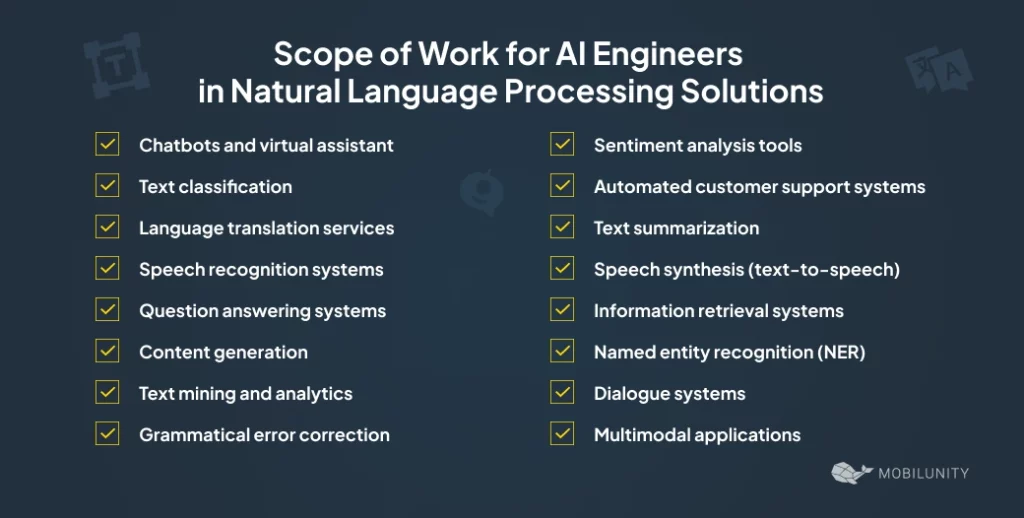
Engineers working on NLP projects create systems capable of comprehending, interpreting, and generating human language — however, none if it is possible without the right set of knowledge and tools:
- Key libraries and modern LLMs — beyond traditional tools like NLTK or spaCy, AI specialists should be skilled at leveraging advanced large language models (LLMs), deploying open-source solutions like Llama or Mistral, and integrating seamlessly with proprietary APIs such as GPT (OpenAI) or Claude (Anthropic).
- ML techniques — incorporates expertise in text classification, sentiment analysis, summarization, and question answering.
- Speech processing — tools like Whisper of Wav2Vec should be used to develop effective voice-activated systems and applications.
Computer Vision
The computer vision field merges principles from image processing and machine learning. This combination allows AI engineers to create systems that analyze, recognize, and generate visual content.
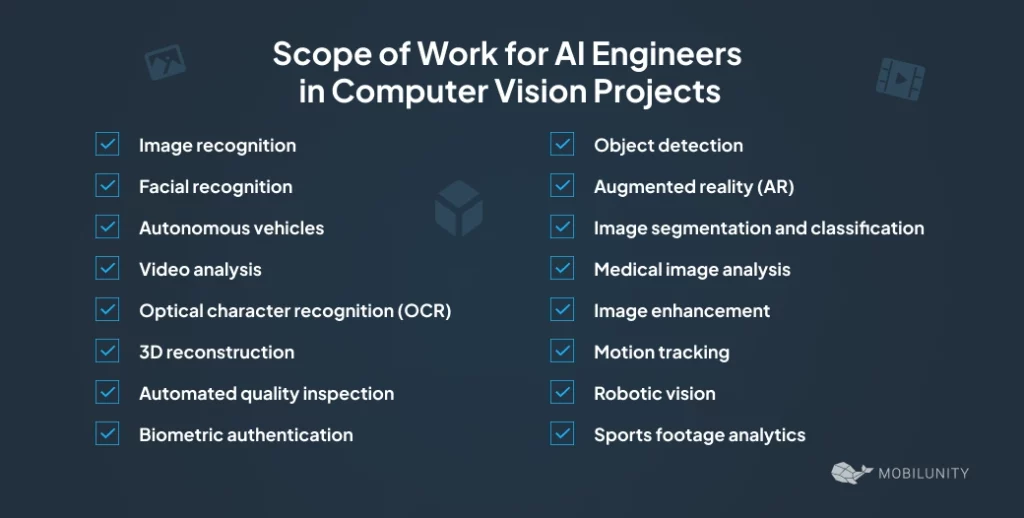
To leverage computer vision solutions efficiently, engineers must possess a robust set of the following knowledge and tools:
- Image processing techniques — implies the use of OpenCV, YOLO, or other tools for object detection and facial recognition;
- Advanced techniques — using GANs, anomaly detection, and image segmentation while dealing with visual information in areas like generative AI, medical imaging, and quality control in manufacturing;
Robotics and Autonomous Systems
Experts working on robotics projects integrate engineering principles with advanced algorithms to create systems that can autonomously perceive their environment, make decisions, and interact with the world.
However, these extensive capabilities demand in-depth knowledge in:
- Control systems and sensor fusion — since integrating sensor data with artificial intelligence framework ensures efficient robotic decision-making;
- Reinforcement learning — applied to robotics for autonomous behavior in dynamic environments.
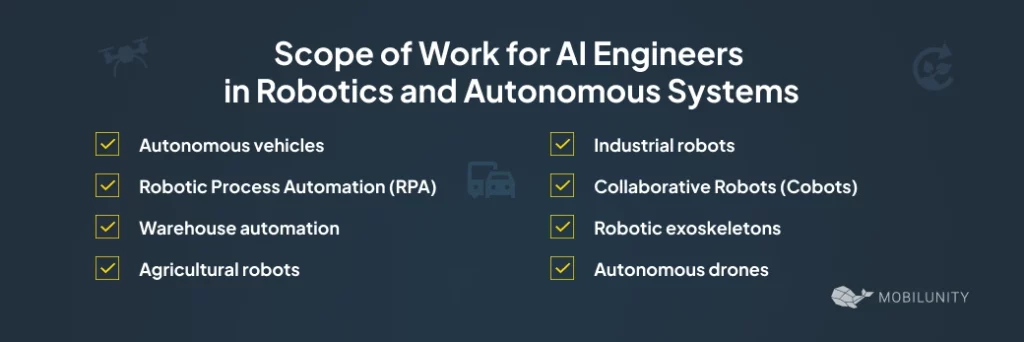
AI Ethical and Security Considerations Every Software Engineer Should Know
As AI-driven technologies become more embedded in everyday life, ensuring these systems operate ethically and securely is paramount for AI-specialized experts. This knowledge includes:
- Ethics and AI governance — ensuring fairness, accountability, and transparency in model decisions;
- Privacy concerns — practical knowledge of various techniques to ensure compliance with data protection regulations like GDPR, such as anonymization, encryption, data minimization, and others;
- Sustainability considerations — understanding and reducing the environmental impact of large AI models;
- Adversarial Machine Learning expertise — understanding model vulnerabilities to adversarial attacks and securing them against potential threats.

Technical Skills Required for AI Engineering Based on Industry Demand for AI
Some industries are adopting AI technologies more enthusiastically than others, with sectors like healthcare, finance, and retail ahead of the curve. Domain-specific expertise in these areas is paramount to leverage efficient AI-powered solutions that yield high results.

Besides a range of specialized AI skills you need to know, there are specific requirements for experts implementing artificial intelligence in certain industries. Check out the table below to review them.

Do Soft Skills Matter? Must-Have Non-Technical Skills for AI Engineers
A common misconception is that AI and ML engineers necessitate solely tech expertise to excel at their jobs. In reality, however, soft skills are also essential qualification criteria. Without them, tech experts might find it hard to communicate their value effectively and create solutions that are both technically and socially sound.
The must-have non-technical competencies for AI developers include:
- Communication skills and collaboration — the ability to explain complex AI-related concepts to non-technical stakeholders and collaborate effectively with cross-functional dedicated teams;
- Problem-solving skills and analytical thinking — a crucial competency for approaching complex challenges with creativity and a data-driven mindset;
- Continuous learning and adaptability — keeping up with the latest industry best practices and the ever-evolving AI landscape.
Where to Learn AI Engineer Skills: Key Career Development Recommendations
To keep up with the fast-evolving industry and technology advancements, AI-specialized developers should continuously expand their expertise with new skills — by benefitting from recent research findings, AI conferences and workshops, online courses, and other learning spaces.
These renowned certifications are a top priority resources allowing to excel in AI:
- Google AI Certifications
- Microsoft Azure AI Certifications
- IBM AI Engineering Professional Certificate
- NVIDIA Certification Programs
- AWS Certified Machine Learning Certificate
- Tensorflow Developer Certificate
Also, consider these courses:
- Online Machine Learning Course by Stanford University
- Machine Learning on Oracle Cloud
- MIT Online Courses in Machine Learning & Artificial Intelligence
- AI Courses by Datacamp

Final Words: A Glimpse into the Future of AI
AI-powered technologies are set to disrupt most industries at an unprecedented pace, with AI engineers at the forefront of technologies.
To deliver next-generation solutions, AI engineers need a comprehensive skill set encompassing technical, analytical, and ethical competencies. As areas like NLP, computer vision, and automation continue to expand, the demand for skilled AI talent will only grow. In response to the evolving trends, AI-specialized engineers will not only develop advanced solutions but also enhance their safety, transparency, and ethical use.
